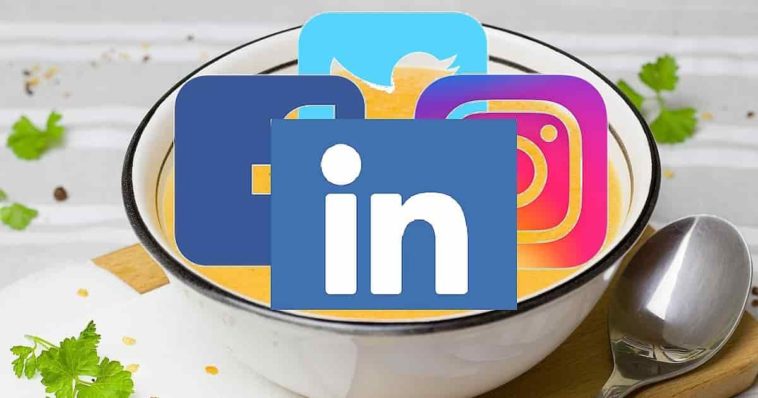From professional to social: LinkedIn’s blurred lines with Twitter and Facebook. What brought about the change?
LinkedIn used to be a platform where professionals would post profession-related content. It would also provide them with tools to network with other professionals. That made it possible for people to share their views and take advantage of career opportunities. At least, that was the initial purpose of LinkedIn back in 2003. So far, it has done a good job on that, and has managed to meet most of our expectations.
Fast forward to 2021, and suddenly we see numerous posts about dogs, nature, sexy photos, or cliché inspirational quotes. So, what happened? Many things, to be precise. Some of them are just a consequence of corporate policies and social norms. Others simply leave question marks, to say the least. LinkedIn hasn’t turned yet into an outright cesspool of random social media posts, but it’s certainly heading that way.
Let’s take an analytical look into the latest LinkedIn trends, and try to explain them.
1. Animal posts
Dogs, cats, butterflies, or whatever you might think of, are posted without any preliminary thought. The posters attempt to justify it by stating something inspirational, such as an important life lesson. Like how much they learned via their dog’s behavior. Others don’t even attempt to hide the vanity of their post. All of them are unrelated and low-quality posts.
Animal posts are not justified by any means in a professional networking platform. They are inappropriate and provide little means of conveying any meaningful message. It’s simply done because the poster needs some virtue-signaling points. Though we all do love animals and feel sympathetic towards them, LinkedIn is not a place for that.
The reason for this is attributed to the users. They show zero effort in keeping the content relative to the nature of the platform. It can also be the habit of making vanity posts on other platforms (e.g. Facebook). Ignorance and a false sense of what others might like, could also play a role
Whatever reason you’re thinking of, keep it to yourself, or post it where it’s relevant. You should also take into account that what you’re expressing here, affects your image toward potential employers and colleagues. You don’t want to feel like a silly clown when people are going to point out the ridiculousness of your content. So, please, think twice before posting.
2. Nature posts
Ah, who doesn’t love nature? We all do. I know. But, is it necessary to see Instagram-tier pictures whenever we log in on LinkedIn? I don’t think so.
The reasons for posting those, as well as the reasons that people shouldn’t, are exactly the same as above.
3. Inspirational quotes
Inspirational quotes can really help you make a comeback at some point in your life. Especially when you feel that everything is collapsing around you., or when you’re depressed. I would never criticize a motivational post, but when the content does not match the poster’s intentions, it becomes a cheesy quote. When you flood the feed with these posts, it just makes me want to unfollow you.
Next time, try to limit their frequency, or at least make them strongly relatable.
4. Things that never happened
This one can better be said with a satirical story, as posted by Nikhil Narayanan on LinkedIn:
“One day, I was on my way to an interview. On my way, I saw a stray dog. It looked hungry and tired. Most people ignored it. But I didn’t. I opened my lunchbox, and gave it my lunch.
While feeding the dog, I got late and missed my interview. I went home disappointed.
The next day, I got a call from the same company asking me to appear for the interview.
I was surprised, but I went anyway. I was asked by an employee to wait in the CEO’s cabin.
5 minutes later, The CEO walked in. It was the dog from the previous day, in a classy suit.
It barked lovingly, wagged its tail, and gave me my appointment letter.
My eyes welled up.“
This is how all those made-up stories sound on LinkedIn. While life-changing events can indeed occur, most of these stories, are outright blatant lies. Please, don’t do this.
5. Corporate shills
Corporate shills are people that attempt to make their employer look too good for this world. They will post fake stories just like the one above. Their post will be centered around the company they work for as their savior and hero.
Similarly, I believe these users should be permanently banned. There is nothing more annoying than a person who tries to humanize the corporate world. Especially the companies that are notoriously famous for mistreating their personnel. Some organizations treat their staff well, and have some rigid policies on social accountability However, shilling for a for-profit company, is simply over the top.
At the end of the day, every employer is the same. They’ll give you money if you make them money. And if you don’t, you’ll be fired. Simple as that. There’s no need to sugarcoat it, and most people won’t buy your mumbo jumbo.
6. Virtue signaling
Usually, the protagonist in the story is the poster himself. The protagonist makes sure to be as detailed and emotional as possible. Usually, the post ends with an inspirational quote or an important life lesson. At the bottom, you’ll also see hashtags about sadness or happiness, just like on Twitter.
I don’t see how this helps the poster in any professional way. That’s similar to a cat licking its butt. LinkedIn is not, or shouldn’t, be your personal diary. Neither it’s appropriate for ego-stroking. The sight of adults acting so immaturely is never appealing.
7. Personal life
Well, at least in your dog posts only your dog was exposed But now you feel that you were left out, so why not post about your marriage problems and the fish you caught yesterday?
I’m not against sharing your personal life with the people that you care about. You should do it, if you think that’s the right thing. However, LinkedIn is not a place for that. Don’t we already have Facebook for this? On Facebook, you can even categorize your connections into “family members” and “friends.” And trust me when I say it, not all your colleagues, or directors, really care about your personal life. They definitely do not want to hear everything you have done every time they open LinkedIn. This might even backfire.
8. “Woke” movements
There are individuals out there that have faced discrimination and bullying due to their social and racial backgrounds. Others because they felt they belonged to a different gender than what they were assigned. So, if the content you’re posting could bring those things to light and change a company’s policy, then go ahead by all means. You have my support.
However, if all we’re seeing in our feed is constant whining about minuscule issues, patriarchy, or bakeries that refuse to bake gender-specific cakes, then please stop. If everybody posts whatever annoys them, the quality of the feed will go downhill. This will make the rest of us steer away and miss the opportunity to take advantage of the platform.
Being politically correct or canceling people by posting their pictures, is a no-no. Doxing in most places is also illegal. This comes from the increasing trend of posts targeting people and their employers, to get them fired.
9. Political propaganda
Similar to the “woke” posts, political posts have nothing to do with any company or profession. Their sole purpose is to spread as much propaganda as possible. And simultaneously they push the current narrative and woke movements.
I suggest everybody reports and hides these kinds of posts, as they’re doing more harm than good. The only thing you can witness in the related comment sections, is counterproductive dialog. At best, intense arguing, and whataboutisms.
10. People that think LinkedIn should be this way
In my experience, there is a considerable number of people that believe that this is the right direction for LinkedIn. They’re convinced that LinkedIn should be an all-purpose service, where you can express anything. They also think that everything that happens in our lives constitutes professional content. Or even worse, provides inspiration to their followers.
Yes, everything that happens in our lives, is what makes us who we are today. But that doesn’t mean that all our opinions need to be uploaded on LinkedIn. It’s not necessary to write about all our personal stories. Not everything is that useful anyway. As previously mentioned, there’s a place and time dedicated to everything you’d wish to express.
Trying to use LinkedIn as an all-purpose platform will never work, because a single platform cannot cover everything. If you attempt to do so, LinkedIn will just get “clogged” by the plethora of redundant information.
Simply put, if you want to check out nice pictures, you visit Pinterest or Google Images. If you want to watch dancing clips you visit TikTok. And if you want to watch porn you visit PornHub. LinkedIn is tailored to professionals that want to create and share profession-related content only.
I agree that the elements that shape the identity of social media platforms are being “blurred” as we speak. However, that doesn’t make it excusable. Instead, we should apply basic logic, and create a quality environment that fosters the purpose of the platform.
Conclusion
LinkedIn is still one of the largest professional networking websites. It has also helped me reach key people and even find a job. It’s easy to use, and it has some intuitive functionalities. That’s why I want it to stay that way.
On the other hand, the social media “fever” has caught up. This removes the boundaries of what made this platform different from the others, and turns it into one big soup. This causes a steady decrease in quality, and, inevitably, the downfall of the original LinkedIn.
At some point, everybody will be forced to look at better alternatives. Blame it on content moderation, or users’ mentality. It’s the same, really.
However, if you want to help and prevent this phenomenon, please be more considerate of the other users. The content you post, and your intentions might need scrutiny before publishing.
Have you faced a similar experience on LinkedIn?
Please, let us know in the comments, and subscribe & follow us for more.





Comments
Loading…